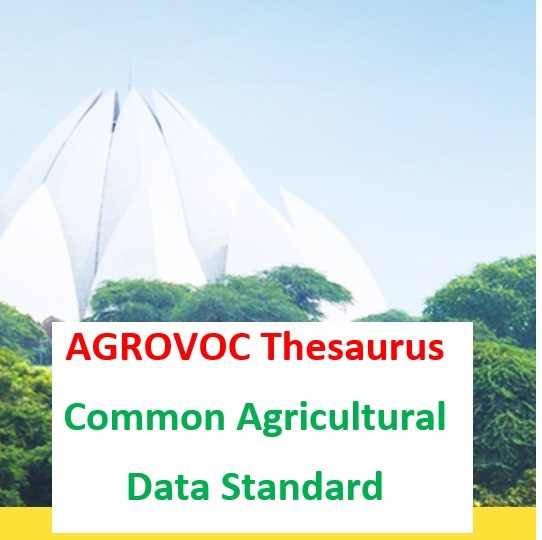AGROVOC recommended as a Common Agricultural Data Standard for Data Sharing Context to accelerate Data-Driven Agriculture Development in Cambodia and Nepal
30/08/2018

AGROVOC has been recommended as a Common Agricultural Data Standard for Data Sharing Context to accelerate Data-Driven Agriculture Development in Cambodia and Nepal.

(Image source: Development GATEWAY)
|
Technology alone cannot lead to data interoperability: consensus-building and change management support are also required to achieve true and sustainable results. |
Rice… is what Nepal and Cambodia have in common…
Data-driven agricultural development in these two countries brings up the topic of if/how agriculture and nutrition data in Nepal and Cambodia are similar enough to manage, share, and use to improve food security outcomes?
To answer this question, Development GATEWAY and its partner Athena Infonomics are implementing the Accelerating Data-Driven Agriculture Development in Cambodia and Nepal Activity – funded by USAID and led by FHI360 through the mSTAR program – to support USAID: Feed the Future stakeholders in both countries to improve their data interoperability and sharing practices.
Data Sharing Context
Within the framework of Accelerating Data-Driven Agriculture Development in Cambodia and Nepal Activity, the following challenges and key data interoperability issues were addressed:
- In-country Feed the Future implementing partners and researchers are operating under unclear or inconsistent data openness and publication policies;
- Data sharing happens on an ad-hoc basis, if at all, since there is lack of formal data sharing mechanisms among partners;
- Stakeholders in both countries (Nepal and Cambodia) want an in-country resource to fill their own data sharing and analysis needs;
- There is need of data exchange among systems;
- Data files should be opened and interpreted;
- Data within the file should be understood by the system.
Analysing and Deploying Data Standards
During the project, approximately 25 sample datasets, representing 3,500+ variables to find common interoperability principles and standards for structuring and defining data were analysed.
Following the recommendations to Feed the Future partners and USAID Missions, the importance of building on standards - - that already exist and are widely used by the open data community in agriculture and related sectors (e.g. data quality and interoperability resources from initiatives like AIMS.FAO.ORG, GODAN and the FAIR data principles) - - was underlined.
Since USAID Feed the Future partners already follow basic data vocabularies and data management protocols, Feed the Future stakeholders are recommended to:
Adopt a standard controlled vocabulary/ontology, like the FAO of the UN AGROVOC multilingual thesaurus, to define the types and properties of variables in the dataset;
- Use standard units of measurement and naming schemes for country-specific variables, like administrative boundaries;
- Follow basic structural standards, like keeping data belonging to the same dataset within a single file; and
- Document key metadata – scope, collection methodology, availability, terms of use – for the project and the dataset.
Keen to learn also about the Human Side Of Interoperability and Tools for Data Management and Storage deployed to support Accelerating Data-Driven Agriculture Development in Cambodia and Nepal Activity? Then take a look at the blog post Can Nepal and Cambodia Really Have Common Agricultural Data Standards? (source: ICTworks™)

Related:
What does Data Interoperability Require in Practice?
- Use of the AGROVOC thesaurus as a common vocabulary in CGIAR Core Metadata Schema and Application Profile
- AGROVOC has moved to VochBench3 (August 2018)
- AGROVOC thesaurus : one of the biggest datasets in the Linguistic Linked Open Data cloud
- AGROVOC achievements, impact, and a strategy for AGROVOC’s future
- Invitation to the Interest Group in Agricultural Data (IGAD) Pre-Meeting RDA P12 in Gaborone, Botswana, 5-8 November, 2018
- Research4life Partners commit to free and low cost Access & Training Through 2025
- Digital and Data-Driven Agriculture: Harnessing the Power of Data for Smallholders
- Open Data Management in Agriculture and Nutrition Online GODAN e-Course
- Developing Data Interoperability using standards: A Wheat Community use case
- What are the Needs when working with Semantic Resources? AGRISEMANTICS collection of use cases in agriculture and nutrition
- Data Interoperability: The Land Portal experience of open data management (recorded webinar)
- Agrowiki is an agricultural wiki which is a subsidiary of Agropedia - an “integrated model of digital content organization in the agricultural domain”. It is hosted and managed by Akvo, an open source Internet and mobile software developer that aims to make “international development cooperation and aid activity more effective and transparent.”
- Big Data Key to Unlocking Innovation in Agriculture for Future Food Security
- Introduction to Text and Data Mining: a free 6 hour online course (from FOSTER & OpenMinTeD projects)
- ICTforAg 2018
- Leveraging Agriculture for Nutritional Impact through the Feed the Future Initiative
- METADATA 2020 : details and crosswalks of the recommendations. Can we agree?
- The Roadmap for a pan-European e-Infrastructure for Open Science in Agri-Food Sciences mentions initiatives in support of agricultural data sharing & handling
- The Time for Open and Interoperable Annotation is Now

To keep up-to-date with AIMS news, please, Sign up for AIMS News, follow @AIMS_Community on Twitter
